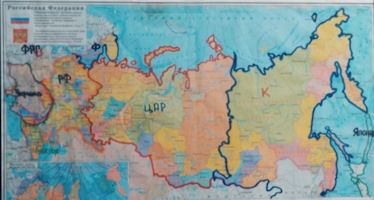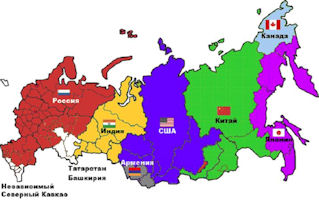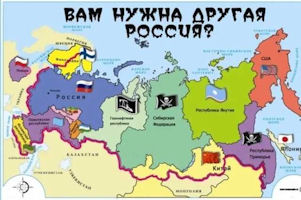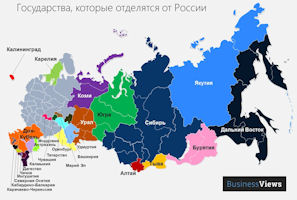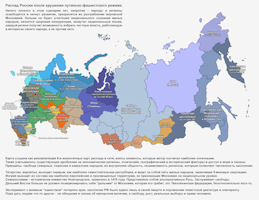Russian Devolution
Opponents of Russia talk about the need to divide the country into dozens of small parts. This was stated 19 May 2023 by Russian President Vladimir Putin at a meeting of the Council for Interethnic Relations. "Practically the entire arsenal of the West is directed against Russia," the president emphasized, "attacks on its values do not stop." Opponents, he said, have decided that multinationality is the weak point of the country, and are trying to divide it. "They say that Russia needs to be divided into dozens of small formations. And it's understandable why. In order to then subjugate to one's will, exploit it in one's own interests," the president said.
Putin said that "idiots" who want to "decolonize" Russia do not understand that national diversity only makes it stronger. "This is the most important basis for our consolidation, which only grows stronger in the face of external aggression and threats, and our opponents, whom I mentioned, people with neo-colonial thinking, idiots, in fact, do not understand that it is this diversity that makes us stronger," Putin said. "I have already said that people who are guided by their neo-colonial ideas are idiots, and they would take second place in the competition of idiots," Vladimir Putin said. "Why only the second one? Only because they are idiots," the president continued.
Putin said that the opponents of the Russian Federation would strengthen their instruments of influencing the country, including through agents. He noted that the geopolitical opponents of the Russian Federation, along with agents within the country, also use "various kinds of political outcasts." "They are trying and will continue to try to rock the country from within," the president stressed. "We must keep in mind that they exist and that they will continue to be used for their own purposes by those who seek to shake us up, in their fight against Russia they will be used," the president said.
Branches of the Assembly of Peoples of Russia should be opened in every region. "There are separate areas in the programs for the socio-economic development of our new regions of Russia that accumulate all the work to strengthen the common civic identity, ensure interethnic, interreligious harmony. The activities in them must be specific and qualitatively measurable, clearly linked to the objectives of the State National Policy Strategy. These tasks are solved on the ground, and success largely depends on a direct dialogue between society and the state, constant interaction between representatives of the country's interethnic and national cultural associations and authorities, at all levels," Putin said at a meeting of the Council on Interethnic Relations.
The West still fears the collapse of the Russian Federation, and there are a number of reasons for this. Security challenges for countries bordering the Russian Federation will become more serious, and the issue of nuclear weapons control remains open. In addition, the impact on the world economy as a result of the defragmentation of Russia can also be quite significant. Doctor of political sciences, expert of the analytical center “United Ukraine” Ihor Petrenko expressed this opinion 15 August 2023 on the air of the TV channel FREEDOM.
And, of course, the question of nuclear weapons remains one of the main ones, says the political scientist: who will control it and how. “There are scenarios that the process of defragmentation of the Russian Federation will look like a war of all against all. And Russia will actually become the center of terrorism. They are a terrorist state anyway. But it will have the appearance of a completely fragmented enclave of various terrorist organizations, of various orientations, which can be used by any world players to their advantage."
An inclination among people to consider themselves first of all as residents of their own region and only then as citizens of the entire country inevitably arises in a situation when large parts of a country – due to economic, transportation or infrastructure reasons – become isolated in many respects from other regions, yet they are economically linked with neighboring countries.
Despite growing talk abroad of Russia’s coming decolonization and the potential role of the war in Ukraine in bringing it about, several factors preclude the country’s disintegration along its regional borders. Alexey Gusev wrote 24 April 2023 "Russia is extremely unlikely to disintegrate along its regional borders for geographical, sociological, economic, and political-administrative reasons. Geographically, the borders of Russia’s regions and republics are essentially abstract, having been repeatedly redrawn between the 1920s and the 1940s. The resulting sinuous lines make as much social and geographical sense as the rectilinear ones for which the United States is so famous. Still, they can give the false impression of large national autonomies, belying, for example, that the Republic of Karelia is made up of 82 percent ethnic Russians and just 7 percent ethnic Karelians. In fact, of the republic’s seventeen districts, only three are home to Karelians."
The US and its allies are seeking to preserve their power by dismantling Russia, with Western think tanks busy formulating the necessary plans, the secretary of Moscow’s Security Council claimed. In an interview published by the Izvestia newspaper on 03 May 2023, Nikolay Patrushev said "“The West is trying to undermine the internal unity of our country and people, to demoralize our citizens, to inspire them with a sense of inferiority. Entire institutions in the US and Europe are working tirelessly to create the craziest pseudoscientific theories. <...> The West is trying to destroy the foundations of the all-Russian and national identity, doing its best to impose innovations alien to us, such as gender diversity and historical revisionism.”
He talked about how American foundations write supposedly scientific papers on how to maintain an unstable situation in states neighboring Russia and incite domestic Russian separatism. This, in the opinion of US experts working on behalf of the State Department and the Defense Department, should be staked on. Patrushev also spoke about the hushing up of Russia's role in the victory over fascism. According to him, now several American foundations are actively acquainting the elite in Washington with their scientific work on plans to split Russia.
The project currently being implemented by the West to create "anti-Russia" aims to tear off the historical territories, today called Ukraine, from Russia. This was stated on 21 February 2023 by Russian President Vladimir Putin in a message to the Federal Assembly. The head of state recalled that the project of creating "anti-Russia", which the West is currently implementing in Ukraine, is "not new." “Let me remind you that in the 30s of the last century, the West actually opened the way for the Nazis to power in Germany, and in our time they began to make anti-Russia out of Ukraine. The project, in fact, is not new. People who are at least a little immersed in history know perfectly well that this project goes back to the 19th century," the Russian leader said.
"It was also nurtured in the Austro-Hungarian Empire, [it was nurtured] by Poland and other countries with one goal: to tear these historical territories, which today are called Ukraine, from our country. This is what this goal is, there is nothing new, no novelty , everyone repeats," the President stressed. "They have one goal: to dismantle the former Soviet Union and its main part, the Russian Federation. And then, perhaps, they will accept us into the so-called family of civilized peoples, but only separately, each part separately. For what? In order to push these parts around and put them under your control."
"If we follow this path, I think that the fate of many peoples of Russia, and above all the Russians, may change dramatically. I don't even know if such an ethnic group as the Russian people can survive in the form in which it exists today. Well, there will be some Muscovites, Urals, and so on ... It was all in the plans, these plans - they are set out on paper. It's just that in the conditions of building relations, we tried not to talk about it for the sake of partner considerations. But it's all there, it's all written on paper. Well, now that their attempts to remake the world after the collapse of the Soviet Union have brought it to such a situation, well, of course, we are forced to respond to this."
In 1941, Yurii Lypa published “The Division of Russia”. He foretold the dissolution of the Soviet Union (Russian Empire) and by extension the Warsaw Pact countries under Russian colonial domination. Lypa wrote "an unsuccessful competition for mobilizationforces of such large spaces and characterizes the entire history of Russia, that isthe history of the Russian Empire. In an effort to connect as much as possibleterrain and national antagonisms, — the rudder shiftedRussia to the strangest thoughts. It is enough to mention the idea of ??indivisibilityof the people of Russia, or the third Rome, ch. last communistof the International".
Former Reagan consultant Edward Luttwak wrote: "The dissolution of the Russian Federation is not the same as the collapse of the USSR . It is similar to the collapse of Austria-Hungary , which many celebrated in 1919 and mourned in 1929. Only if the PRC is dissolved first, can we get by without the Russian Federation. The dissolution cannot begin with Russia, because the parts that have separated from it, located between them, will become vassals of China."
Russia’s war on Ukraine — and before that on Syria, Libya, Georgia, and Chechnya — exposed Russia’s imperial character to the entire world. Its aggression catalyzed a long-overdue conversation about Russia’s interior empire - Moscow’s dominion over many indigenous non-Russian nations, and the brutal extent to which the Kremlin has taken to suppress their national self-expression and self-determination.
Serious and controversial discussions are now underway about reckoning with Russia’s fundamental imperialism and the need to “decolonize” Russia for it to become a viable stakeholder in European security and stability. As the successor to the Soviet Union, which cloaked its colonial agenda in anti-imperial and anti-capitalist nomenclature, Russia has yet to attract appropriate scrutiny for its consistent and oftentimes brutal imperial tendencies.
Representatives of national minorities of Russia adopted a declaration on the decolonization of Russia in Prague 25 July 2022. The first Free Nations of Russia Forum took place in Warsaw on 08 May 2022, split from the Free Russia Forum. The second Forum of the Free Nations of Russia debated the “radical reconstruction and structural transformation of Russia in favour of its nations and regions”, according to a press release published by the organisers.
The conference was attended by representatives of the Russian opposition, participants of regional and national movements, public activists, and experts, including former Ukrainian Foreign Minister Pavlo Klimkin. As noted in the announcements of the conference, if “the famous leaders of the Russian opposition want to replace the bad Kremlin king with a good one,” then the Forum of Free Nations is devoted to radically restructuring Russia, which should be “decolonized, deimperialized, and deputinized,” Novynarnia reported.
A map was published on the forum, where Russia is divided into 34 states, including an independent Chechnya and Siberia. Political scientist Alexander Kynev said that the "little-known [separatist or confederalist] participants of the Forum, who have little understanding of the mood inside the country, presented a gift to Russian propaganda, which already periodically repeats that the enemies of Russia want to split and destroy it."
"What happened was a gift to Russian propaganda, which already periodically repeats that the enemies of Russia want to crush and destroy it. It is unlikely that we are talking about conspiracy theories of the almost secret participation of Russian propaganda in organizing this outrage. Most likely, some forces abroad decided to hold the event, little understanding of the mood inside the country, not taking into account the extremely negative memories of the majority of its inhabitants about the relatively recent collapse of the USSR. Probably, they expected to stimulate centrifugal moods, but de facto they helped once again discredit the opposition (the layman will not understand that all this may have nothing to do with real opposition, both external and internal).....
"In the Russian Federation, according to the 2010 census, in all territories and regions, the share of Russians ranges from 80% to 95%, the lowest percentage of Russians is in the Astrakhan region (67.57%) and the Ulyanovsk region (73.58%). ...
"In the worst case for the country, "shedding" is possible somewhere along the edges due to the border national regions with more cohesive elites and with the dominance of local ethnic groups (North Caucasus, Tyva). But do not forget that almost all of these regions are subsidized and depend on the financial support of the federal center."
Leonid Volkov, the leader of the Navalny movement, said that there is no objective reason for Russia to disintegrate either while Vladimir Putin remains in power or after he leaves office, thereby seeking to calm both those who fear it is falling apart now or will do so without Putin in place, Kharun Sidorov said. The Navalny ally made that argument about the fate of the Russian Federation on a YouTube video ; Sidorov, a Prague-based Russian analyst, recapitulated his words and discusses them on the IdelReal pdrtal.
According to Sidorov, Volkov dismissed as absurd the view that Russia will fall apart because it is so large and argues that it won’t come apart as the USSR did because it is much more culturally homogeneous and unites regions that are “economically interested in cooperating with one another.”
"Besides Chechnya, there are only a few regions in Russia such as Sakha Republic, Tyva, and a few republics in the North Caucasus which are ethnically, culturally, and historically to a much lesser degree part of Russia than typical Russian regions.” But he argues that even these republics don’t want to leave because they are subsidized by Moscow.
Oleksandr Aleksandrovych [Ukraine’s Ambassador to Serbia since 2015], argued 18.09.2019 "Any attempts to pacify Russia and to do business as usual leads only to its increased arrogance, as was the case with the return of the Russian delegation to PACE. Any attempts to seek a civilized modus vivendi with Russians are a priori doomed to fail, because such a solution runs counter to the basic expansionistic mindset of the Kremlin regime, regardless of the surname of its current president and even irrespective of ideology or form of governance. The history of Moscow czars, Russian empire, USSR and modern Russian Federation reflects almost identical methods of both internal politics and foreign policy behavior. The Russian Federation within its current borders and with its current resources is not able to ever become a normal civilized nation. On the other hand, a Russia shrunk to the size of its current European territory, deprived of WMDs and of its permanent seat in the UN Security Council, has a big chance to become a responsible regional player, maybe even become a NATO or EU member, in peace with all its neighbors."
Janusz Bugajski, a senior fellow at conservative Washington-based think tank The Jamestown Foundation, made the case for the dissolution of Russia, claiming it had failed to become “a nation state, a civic state or a stable imperial state.” Bugajski cited a range of factors that supposedly work against Russia, including a lack of economic growth, inequality, distrust in government institutions, the alienation of the population from the ruling elites, and “disbelief in official propaganda.” He concluded "Russia is not a nation-state like most of Europe, but a vast colonial empire that remains to be de-colonialized."
In May 2022, US journalist Casey Mitchell called for the "decolonization" of Russia. In his view, the dissolution of the former Soviet Union should be continued, to end the rule of Moscow over the republics of Russia. Weeks later, the Commission on Security and Cooperation in Europe held an event discussing "the need to 'decolonize' Russia" because of "Russia's barbaric war on Ukraine", as they put it, calling for a conversation about Russia's "interior empire" and noting "Moscow's dominion over many indigenous non-Russian nations".
Vladimir Putin himself already planted a bomb under a unified Russian Federation during the COVID-19 pandemic by shifting all the responsibility to the regional authorities. Now the regional authorities are starting to use these powers in a situation of political instability -- which is really unfolding now in Russia, despite the appearance of such police brutality. Against the backdrop of growing problems in the economy, a drop in the level of confidence in the Kremlin, the emergence of armed formations that are not controlled (in the future) by the center, this is an extremely risky adventure for Moscow. All of these - private military companies that report primarily to their leaders, regional "armies", which Kadyrov actually calls for - may well be the first step towards civil war.
Under Russian law, the idea of regions carrying out their own individual military mobilizations is clearly illegal, said Sergei Krivenko, the head of the Citizen.Army.Law nongovernmental aid organization. "Russia, of course, has a federative structure," he told Current Time, the Russian-language network run by RFE/RL in cooperation with VOA. "But all matters of security and the formation and activity of the armed forces are exclusive functions of the central government. ... Any mobilization or the formation of separate military units outside the Defense Ministry or the National Guard should be impossible and illegal ....But, of course, it is possible, but it is illegal."
Today Russia is attacking not only Ukraine, it has completely nullified international law as a concept of interstate communication. The Russian Federation shows that in the modern world it is possible to commit a large number of war crimes and not be punished for it. Mykhailo Podolyak, adviser to the head of the Office of the President of Ukraine (OPU), shared this opinion 20 August 2023 on the air of the FREEDOM TV channel.
Such behavior would demoralize other countries as well, Podolyak says, which will encourage continued expansion into Ukrainian territory and a more aggressive foreign policy than was the case before the full-scale invasion began in 2022. “Therefore, it is absolutely clear that Russia in such a political form as it is today cannot continue to exist. Otherwise, then the world will always be forced to think that tomorrow the next war will arise somewhere else. Russia is a country with a revanchist military imperial complex, which must be realized through the suppression of other, external opponents, as Russia itself constantly says about this, because otherwise it will not be able to control its large impoverished territory,” said the guest on the air.
The meaning of the existence of the Russian Federation is to receive raw money. Part of it plunders, and the other part is invested in military technology in order to further attack foreign markets and other countries, says Podolyak. “Russia is a very simple, primitive country, and it is obvious that she will not calm down. Under Putin, all this has been brought to, shall we say, climax. That is, Russia does not have any other concepts, they say, let’s invest in science, technology, in the development of trade relations. All its main investments today are corruption, war and the humiliation of other countries,” summed up the adviser to the head of the OPU.
|
NEWSLETTER
|
| Join the GlobalSecurity.org mailing list |
|
|
|


